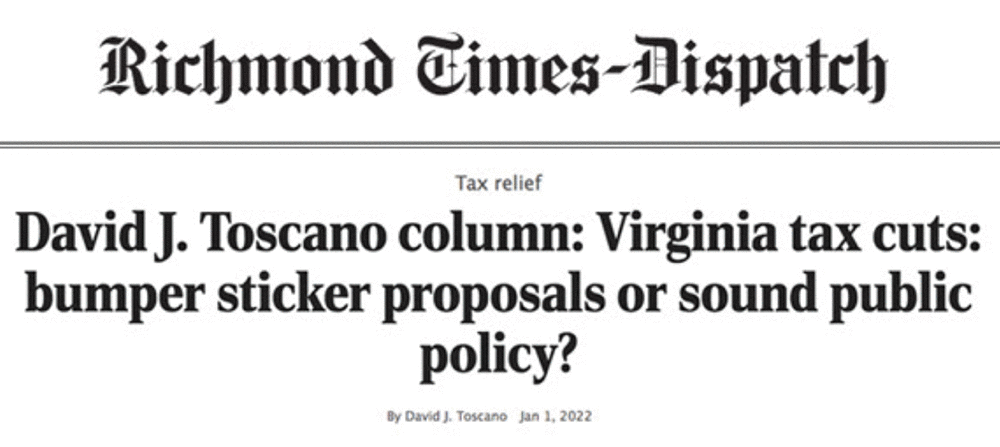
Note: You can read this on the Richmond Times Dispatch website.
As an elected official, you learn early the difference between bumper sticker proposals and solid public policy. During the recent campaign, Governor-elect Glenn Youngkin argued for extensive tax cuts without really discussing their implications. And as we saw from former Governor Jim Gilmore’s car tax cut two decades ago, tax relief not only impacts people differently depending on their income but also can affect the ability of Virginia to provide critical services to its citizens. The Gilmore car tax cut created serious imbalances in Virginia’s budget, and it took Mark Warner and moderate Republicans to fix the revenue shortfall several years later. It also convinced many Virginians that we should not repeat that experience with a hastily enacted tax cut.

Campaigning vs. Governing
The campaign is over, and it is now time to govern. We have yet to see the incoming Governor’s proposals, but outgoing Governor Northam has not been shy about advocating targeted tax relief, proposing a cut in the grocery tax, tax rebates of $250 to individuals and $500 to married couples, making 15% of the federal earned income-tax credit refundable for eligible families, and ending the accelerated sales tax payments for retailers. There is certainly a long way to go before any relief is passed, but here are some factors to consider as we access the various proposals.
- One reason some tax relief is justified is that the Virginia economy continues to improve. During the campaign, there were many allegations that the state’s economy was “in the ditch,” but the surplus revenues show that the Commonwealth is recovering robustly from the pandemic.
- The recovery has been uneven; many working families and residents of certain parts of the state have not benefited by this improvement as much as others. For them, Northam’s proposed one-time rebate, a reduction in the food tax, and changes in the child tax credit would help them balance their budgets.
Less Revenue for Schools
- Cutting taxes means less revenue. A portion of the grocery tax is rebated to local schools, and to protect against this loss ($262 million in the second year), Northam’s proposal replaces those revenues by transfers from the state to the localities. The Governor’s proposal does not, however, replace the .5 % of the tax that is presently earmarked ($133 million in the second year) for transportation funding.
- Virginia is not known as a high tax state.
- Virginia’s income tax continues to be one of the least progressive taxes of all states in the nation. The top rate of 5.75% applies both to families who earn $17,000 per year and those who earn more than $1 million. Delegate Vivian Watts and other legislators are involved in a comprehensive study on tax reform, but it will not be completed until later this year. While there is some argument that no tax changes should be made until this study is completed, there is strong political pressure to do something, and Northam’s proposal provides some relief to those who need it most.
One-Time Rebate vs. Sustained Cut
- A one-time rebate has different impacts on the budget than a statutory change that eliminates the grocery tax. The latter has a continuing impact on the budget, and legislators would be prudent to review projected revenues before enacting any tax cut that will hurt critical services in the next budget cycle. Continuing relief should be predicated on the notion that it can be paid for, that is, that we can count on the economy to continue its present positive course so that the revenues are available to provide the relief without cutting into key programs. To be sure, a one-time rebate will require some reductions in spending for capital improvements such as school construction and state infrastructure, but the present surplus certainly provides enough cushion to fund the proposed transfers to the public. Not only that—the proposal is more progressive than the reduction of the grocery tax. A one-time rebate goes equally to the millionaire and to the person who earns the minimum wage.
Of all the issues the General Assembly considers, tax policy is one of the most complex. While our economic condition can justify some level of tax relief, it should be approached judiciously so that all impacts are considered before final plans are adopted. In Richmond, you frequently hear the phrase “Governors propose and the legislature disposes.” In 2022, we will see how the General Assembly handles Northam’s final budget and the proposals of a new administration.

